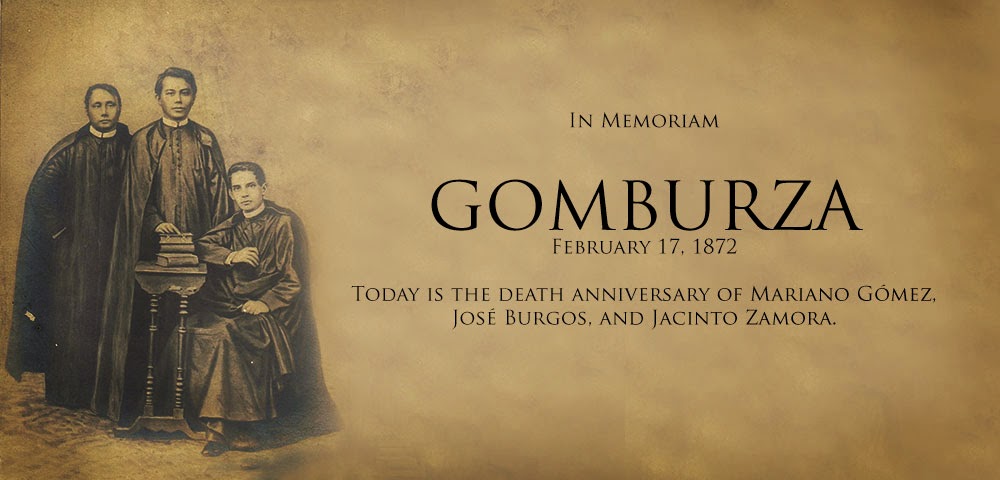The notorious Dámaso
Verdolagas or plainly Padre Dámaso in José
Rizal’s novel “Noli Me Tangere,” became the epitome of priestly abuses and
hypocrisy to this very day. No doubt, there are still a lot of Dámasos in our
midst. We hate the modern-day Damasos but have forgotten the martyrdom of three secular priests
in Mariano Gomez, Jose Burgos and Jacinto Zamora, known collectively as
Gomburza.
Today is the 143rd anniversary of the February 17, 1872 execution
of Gomburza as per records of the Spanish government, but according to the La
Solidaridad and French newsman Edmund Plauchut, it took place on February 16,
1872. Philippine history has it that the aftermath of the so-called Cavite mutiny
was a mass purging of people who have been suspected of having led or supported
it. On the day the news of the uprising reached the central government in Manila,
the Governor-General immediately caused the arrest of prominent priests and
civilians as conspirators of the mutiny, among them, the Gomburza.
In an article written by Philippine historian Ambeth Ocampo, he said that during the trial, the principal witness was a certain Francisco Saldua who
testified that the mutiny was a conspiracy, and confessed that he was a part of
it. He wished to be pardoned in exchange for his testimony. He narrated on the
trial that for three times he delivered messages to Fr. Jacinto Zamora, who had
then gone to Burgos’ abode. Saldua said that the conspirators met at the home
of certain Lorenzana.
Some military witnesses testified that they were told that should
the uprising succeed, the president of the republic would be Fr. Burgos, parish
priest of the Manila Cathedral but all were just hearsay. A fellow priest, Fray
Norvel, testified that the Creoles were inciting the people to rise up in arms
against Spain, and that he saw Burgos passing subversive pamphlets. Lies and
unfounded information subdued the trial.
Fr. Burgos’ landlady testified as a sort of character witness.
She vouched that Fr. Burgos was a peaceful man and with no liking for gossip.
She said that Fr. Burgos would even advise the insurgents to seek reforms
without spilling of blood or the recourse to violent means. He was the most
distinguished among the three, having earned two doctorates one in theology and
another in canon law. He was a prolific
writer and was connected with the Manila Cathedral, a good swordsman and
boxer. Burgos got into a quarrel more
than once with his superior, Archbishop of Manila Gregorio Martinez, regarding
the right of native secular clergy over those newly-arrived priests from Spain.
After eight hours of trial, according to Ocampo, the Council of
War condemned to die in the garrote the three priests Don Jose Burgos, Mariano
Gomez, and Jacinto Zamora. Padre Burgos’ last words are as follows:"But I haven't committed any
crime!" Reportedly one of the friars holding him down hissed, "Even Christ was innocent!" It
was only then, it is said, when Padre Burgos freely accepted his death.
There are present-day idiots like Francisco Saldua who, in order to
save their neck, point at fellow human being with his far-fetched accusations.
There are also the likes of Fray Norvel who has the bad feeling and implicate and accuse his brother priests.
And there are still Archbishop Martinezes among us who favor friars (priests) from other places than the homegrown clergy.
They are, too, the Padre Dámasos of our time…







No comments:
Post a Comment